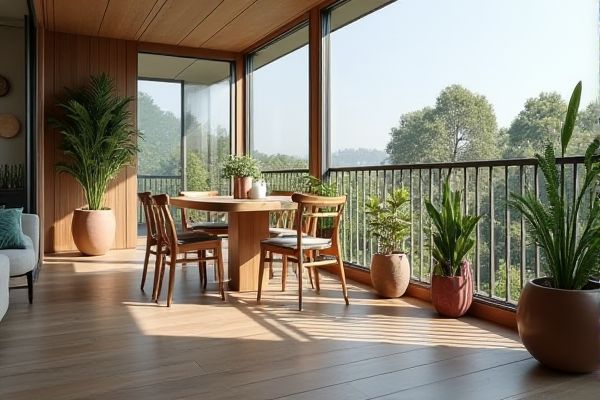
Folding balcony tables offer versatile space-saving solutions ideal for small balconies, while fixed balcony tables provide stable, permanent surfaces that enhance outdoor living and decor. Discover which balcony table suits Your lifestyle and maximizes your outdoor space by reading the rest of the article.
Table of Comparison
| Feature | Folding Balcony Table | Fixed Balcony Table |
|---|---|---|
| Space Efficiency | Highly space-saving, folds flat when not in use | Occupies permanent space, no folding capability |
| Installation | Easy to install, often wall-mounted with hinges | Requires sturdy mounting or support, more permanent |
| Durability | Moderate; hinges may wear over time | High; solid, fixed structure |
| Usage | Better for occasional use and small balconies | Ideal for regular use and larger balcony spaces |
| Weight Capacity | Usually supports lighter loads | Can support heavier items and equipment |
| Maintenance | Requires occasional hinge lubrication and checks | Minimal maintenance needed |
| Cost | Generally more affordable | Typically higher price due to materials and installation |
Overview of Folding vs Fixed Balcony Tables
Folding balcony tables offer space-saving flexibility by easily collapsing against the wall, ideal for small or multi-use balconies, while fixed balcony tables provide a sturdy, permanent surface suited for larger outdoor areas. Folding tables typically feature lightweight materials such as aluminum or plastic, enhancing portability and ease of storage, whereas fixed tables often use durable materials like wood, metal, or stone for enhanced stability and weather resistance. Choosing between folding and fixed balcony tables hinges on available space, usability preferences, and the desired balance between portability and durability.
Space-Saving Benefits
Folding balcony tables offer significant space-saving benefits compared to fixed balcony tables by allowing you to collapse the surface when not in use, freeing up valuable floor area. These tables are ideal for small or narrow balconies where maximizing movement and storage is crucial. Your outdoor space can feel less cluttered and more versatile with a folding table that adjusts to your needs.
Installation and Setup
Folding balcony tables offer quick and straightforward installation, often requiring just minimal wall-mounting hardware or a simple clamp, making them ideal for small spaces and renters. Fixed balcony tables typically demand more extensive setup, including secure anchors and precise measurements to ensure stability, which can be more time-consuming and permanent. You can save time and easily adjust your balcony layout with a folding table, while fixed tables provide a durable, stationary solution for long-term use.
Durability and Material Choices
Folding balcony tables are typically crafted from lightweight materials like aluminum or plastic composites, offering portability but sometimes compromising long-term durability compared to fixed balcony tables made from robust materials like solid wood or wrought iron. Fixed balcony tables provide greater stability and withstand harsh weather conditions better, making them ideal for permanent outdoor setups where resilience is crucial. Your choice between the two should consider how much exposure to elements the table will face and the importance of material strength versus convenience.
Flexibility and Usage Scenarios
Folding balcony tables offer superior flexibility by allowing easy storage and space-saving, making them ideal for small balconies or multi-use outdoor areas. Fixed balcony tables provide stability and durability, suited for permanent setups where space is less constrained and consistent usage is expected. Choosing between the two depends on balcony size, frequency of use, and the need for adaptability in outdoor furniture arrangements.
Aesthetic Appeal and Design Options
Folding balcony tables offer versatile aesthetic appeal with sleek, space-saving designs that adapt to various balcony sizes, providing a modern and minimalist look. Fixed balcony tables often feature a more robust and permanent design, allowing for elaborate styles and materials that enhance your balcony's overall decor. Your choice shapes both the functional use and visual harmony of outdoor space, balancing compactness with design complexity.
Maintenance Requirements
Folding balcony tables demand less maintenance due to their compact design, which allows easy storage and protection from weather damage when not in use. Fixed balcony tables require more frequent upkeep, as constant exposure to outdoor elements can cause wear and tear, necessitating regular cleaning and potential refinishing. Your choice should consider how much time you're willing to invest in maintenance to keep your balcony table in optimal condition.
Cost Comparison
Folding balcony tables generally offer a more cost-effective solution compared to fixed balcony tables due to their lightweight materials and compact design. Fixed balcony tables often require sturdy construction and more durable materials, leading to higher prices. Your budget considerations should weigh the initial investment against long-term durability and space requirements.
Safety and Stability
Folding balcony tables offer versatility but may have less stability compared to fixed balcony tables, which provide a solid and secure surface ideal for safer use in windy conditions. Fixed tables are anchored firmly, reducing the risk of tipping or wobbling, making them a safer choice for heavy items or frequent use. Your decision should prioritize safety and stability based on your balcony's space and usage needs.
Which Table Type Suits Your Balcony Best?
Folding balcony tables offer versatility and space-saving benefits, making them ideal for small or narrow balconies where maximizing area is crucial. Fixed balcony tables provide stability and durability, better suited for larger balconies that can accommodate permanent furniture. Choosing the right table depends on balcony size, available space, and intended use, with folding tables enhancing flexibility and fixed tables ensuring robust functionality.
 homyna.com
homyna.com